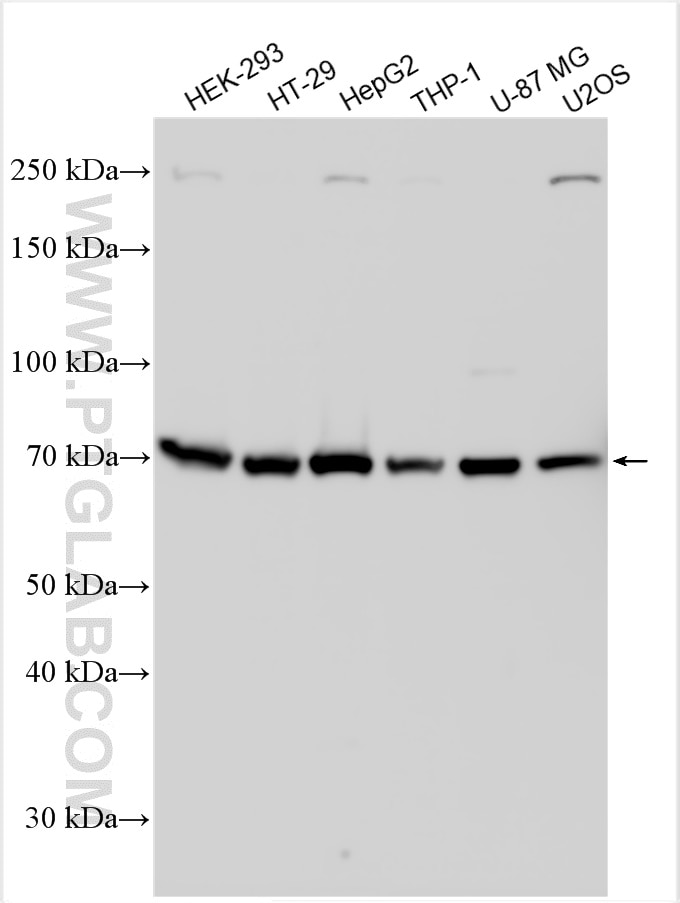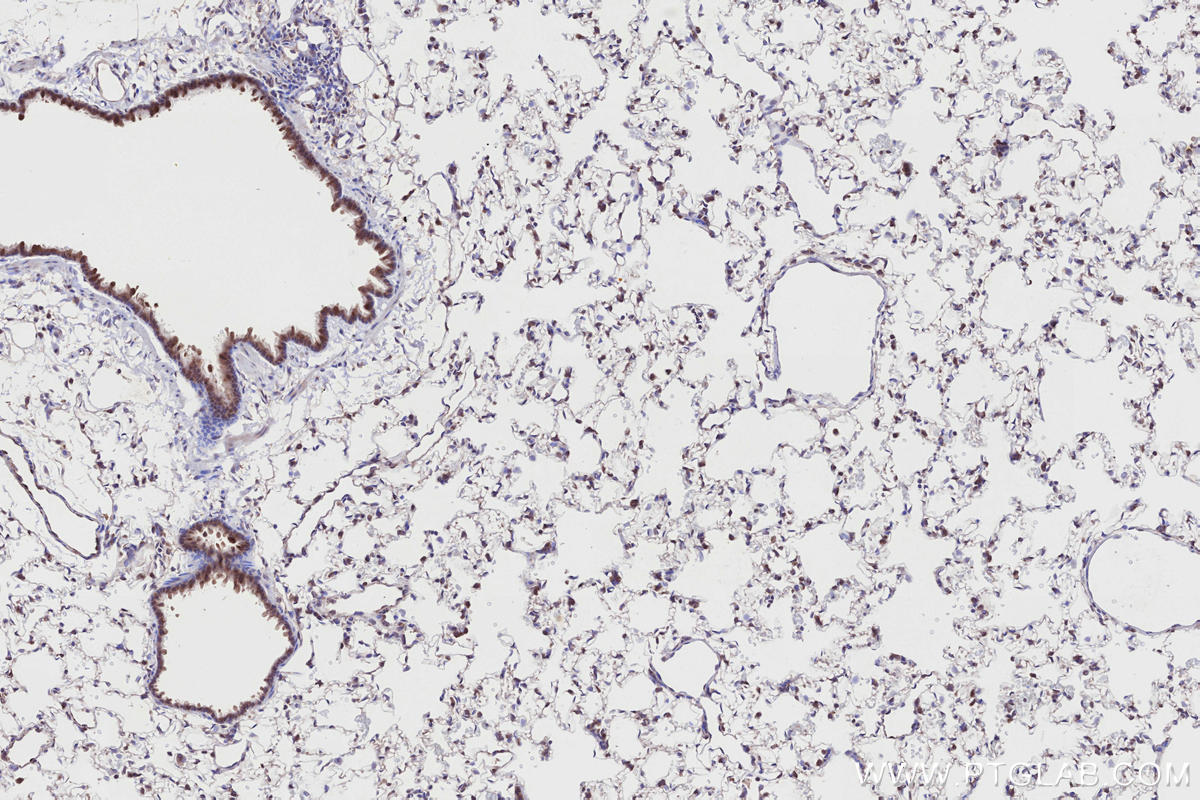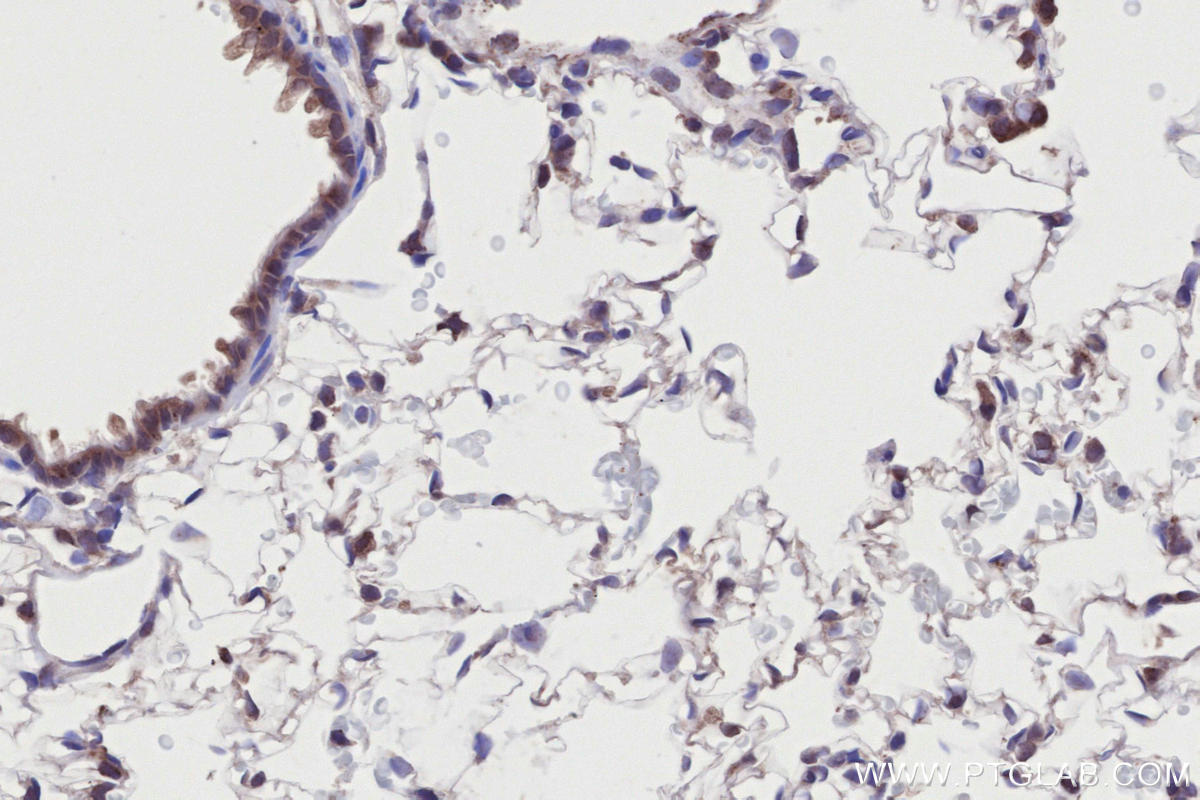Anticorps Polyclonal de lapin anti-RNF139
RNF139 Polyclonal Antibody for WB, IHC, ELISA
Hôte / Isotype
Lapin / IgG
Réactivité testée
Humain, rat, souris
Applications
WB, IHC, ELISA
Conjugaison
Non conjugué
N° de cat : 28261-1-AP
Synonymes
Galerie de données de validation
Applications testées
| Résultats positifs en WB | cellules HEK-293, cellules HepG2, cellules HT-29, cellules MG U-87, cellules THP-1, cellules U2OS |
| Résultats positifs en IHC | tissu pulmonaire de rat, il est suggéré de démasquer l'antigène avec un tampon de TE buffer pH 9.0; (*) À défaut, 'le démasquage de l'antigène peut être 'effectué avec un tampon citrate pH 6,0. |
Dilution recommandée
| Application | Dilution |
|---|---|
| Western Blot (WB) | WB : 1:1000-1:4000 |
| Immunohistochimie (IHC) | IHC : 1:1000-1:4000 |
| It is recommended that this reagent should be titrated in each testing system to obtain optimal results. | |
| Sample-dependent, check data in validation data gallery | |
Informations sur le produit
28261-1-AP cible RNF139 dans les applications de WB, IHC, ELISA et montre une réactivité avec des échantillons Humain, rat, souris
| Réactivité | Humain, rat, souris |
| Hôte / Isotype | Lapin / IgG |
| Clonalité | Polyclonal |
| Type | Anticorps |
| Immunogène | RNF139 Protéine recombinante Ag27147 |
| Nom complet | ring finger protein 139 |
| Masse moléculaire calculée | 664 aa, 76 kDa |
| Poids moléculaire observé | 70 kDa |
| Numéro d’acquisition GenBank | BC064636 |
| Symbole du gène | RNF139 |
| Identification du gène (NCBI) | 11236 |
| Conjugaison | Non conjugué |
| Forme | Liquide |
| Méthode de purification | Purification par affinité contre l'antigène |
| Tampon de stockage | PBS with 0.02% sodium azide and 50% glycerol |
| Conditions de stockage | Stocker à -20°C. Stable pendant un an après l'expédition. L'aliquotage n'est pas nécessaire pour le stockage à -20oC Les 20ul contiennent 0,1% de BSA. |
Informations générales
The RNF139 gene (ring-finger protein 139), also known as TRC8 (translocation in renal carcinoma from chromosome 8), was first identified from a family with 3;8 chromosomal translocation and hereditary renal cell carcinoma and thyroid cancer (PMID:22689053). RNF139 encodes an endoplasmic reticulum (ER) protein with 10 transmembrane segments that contain a sterol-sensing domain and a RING finger motif encoding an E3 ubiquitin ligase (PMID: 19706601). Northern blot and dot blot show that RNF139 is highly expressed in the testis, placenta, and adrenal gland and is expressed at lower levels in the heart, brain, liver, skeletal muscle, and pancreas (PMID: 9689122). It is reported that TRC8 suppresses tumorigenesis by targeting heme oxygenase-1 (HO-1), an antioxidant enzyme highly expressed in various cancers, for ubiquitination and degradation (PMID:22689053). TRC8 is also involved in cholesterol and fatty acid biosynthesis that are transcriptionally regulated by the sterol response element binding proteins (SREBPs) (PMID:17016439). Acetylation, phosphorylation, and autoubiquitination are common post-translational modifications of FNF139 protein.
Protocole
| Product Specific Protocols | |
|---|---|
| WB protocol for RNF139 antibody 28261-1-AP | Download protocol |
| Standard Protocols | |
|---|---|
| Click here to view our Standard Protocols |




